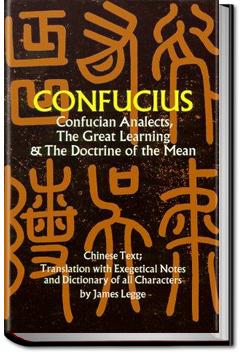UNLIMITED Audiobooks and eBooks
Over 40,000 books & works on all major devices
Get ALL YOU CAN for FREE for 30 days!
The Analects of Confucius
Confucius
Book Overview:
The Analects, or Lunyu, also known as the Analects of Confucius, are considered a record of the words and acts of the central Chinese thinker and philosopher Confucius and his disciples, as well as the discussions they held. Written during the Spring and Autumn Period through the Warring States Period (ca. 475 BC - 221 BC), the Analects is the representative work of Confucianism and continues to have a substantial influence on Chinese and East Asian thought and values today. William Jennings was a rector of Grasmere, and late colonial chaplain. He served at St. John's Cathedral in Hong Kong.
The Analects, or Lunyu, also known as the Analects of Confucius, are considered a record of the words and acts of the central Chinese thinker and philosopher Confucius and his disciples, as well as the discussions they held. Written during the Spring and Autumn Period through the Warring States Period (ca. 475 BC - 221 BC), the Analects is the representative work of Confucianism and continues to have a substantial influence on Chinese and East Asian thought and values today. William Jennings was a rector of Grasmere, and late colonial chaplain. He served at St. John's Cathedral in Hong Kong.
How does All You Can Books work?
All You Can Books gives you UNLIMITED access to over 40,000 Audiobooks, eBooks, and Foreign Language courses. Download as many audiobooks, ebooks, language audio courses, and language e-workbooks as you want during the FREE trial and it's all yours to keep even if you cancel during the FREE trial. The service works on any major device including computers, smartphones, music players, e-readers, and tablets. You can try the service for FREE for 30 days then it's just $19.99 per month after that. So for the price everyone else charges for just 1 book, we offer you UNLIMITED audio books, e-books and language courses to download and enjoy as you please. No restrictions.
"'Free from trouble and apprehension!'" said he. "Does that make them 'superior men'?"
The Master added, "Where there is found, upon introspection, to be no chronic disease, how shall there be any trouble? how shall there be any apprehension?"
The same disciple, being in trouble, remarked, "I am alone in having no brother, while all else have theirs—younger or elder."
Tsz-hiá said to him, "I have heard this: 'Death and life have destined times; wealth and honors rest with Heaven. Let the superior man keep watch over himself without ceasing, showing deference to others, with propriety of manners—and all within the four seas will be his brethren. How should he be distressed for lack of brothers!'" [29]
Tsz-chang asked wh. . . Read More
Try now for FREE!

"Love your service - thanks so much for what you do!"
- Customer Cathryn Mazer
"I did not realize that you would have so many audio books I would enjoy"
- Customer Sharon Morrison
"For all my fellow Audio Book & E-Book regulars:
This is about as close to nirvana as I have found!"
- Twitter post from @bobbyekat



Community Reviews
There are two things that are commonly labeled ‘philosophy’. The first is philosophy sensu strictu, which deals with technical problems in its various branches, such as epistemology, metaphysics, ethics, etc. The other is what one could call a “philosophy of life”, a vague category that one encounte
In a class taught by General George S. Patton, IV at the George Washington University in the early 80's, reflecting on his experience in Vietnam, he summarized the failure of US policy in SE Asia as a failure to understand the history and culture of the region.
Years later as I prepared to deploy to
Confucius has a lot of wisdom. Anyone who is serious about living life well would do well to read the Analects.
Poignant Quotes:
If you try to guide the common people with coercive regulations and keep them in line with punishments, the common people will become evasive and will have no sense of shame
When Confucius was asked what he thought about the idea of being kind to someone who does you wrong, he pointed out that this would be unfair to people who treat you right, who deserve to be treated better than people who do you wrong. Confucius was therefore an advocate of justice, was Aristotle. J
“Is it not indeed a pleasure to acquire knowledge and constantly to exercise oneself therein?”
It really is. It’s a noble pursuit, forever trying to learn and improve and become the best you possible. And in a way, that’s the main drive behind these teachings: self-improvement.
I’ve met so many
تا حالا زياد جملات زيبا و بى نظيرى از كنفوسيوس شنيديم. با كمال تأثر و تأسف، بايد اعلام كنم كه همه شون جعلى هستن، يكى از موارد تب جملات جعلى به بزرگان نسبت دادن.
جملات خود كنفوسيوس، بسيار خسته كننده و عارى از هر گونه زيبايى و نكته ى اخلاقى خاص هستن. به زحمت مى تونيد دو سه جمله پيدا كنيد كه ارزش نقل قو